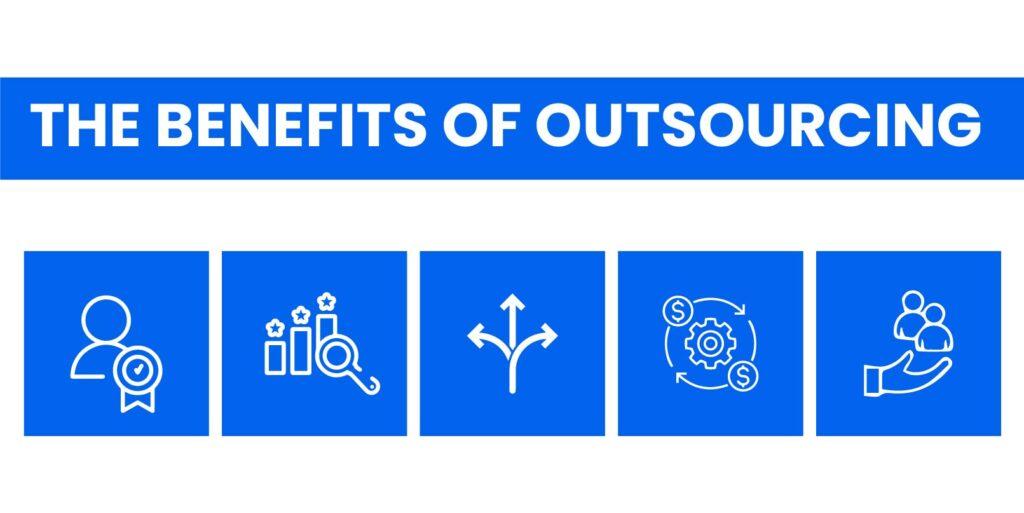Compared to the ideas and practices that have dominated the discourse in business management and methodology for decades, international outsourcing is still conceptually in its infancy. Simply put, there is an air of skepticism in the business community regarding the viability and value of outsourcing functions of a business to an external agency. In his research paper titled “Outsourcing: The Concept”, Victor-Adrian Troacă points to great minds like Henry Kissinger and Gary Hamel, who expressed doubt in the benefit of outsourcing to US-based companies.
While there is no definite answer to these doubts, by observing the evolution and rising popularity of outsourcing in recent years we can assess whether outsourcing is a net benefit or detriment to companies.
Table of Contents
What Is Outsourcing?
In simple terms, outsourcing refers to the subletting of a business function to a third-party entity, usually an outsourcing agency.
Outsourcing as a business practice has skyrocketed in popularity among entrepreneurs. Data from Clutch indicates that in 2019, 37% of small businesses outsourced at least one business function, with 52% planning to outsource in the future. With the Covid-19 pandemic trimming the workforce drastically, as well as creating a financially uncertain landscape for businesses, Deloitte discusses the boom in outsourcing popularity to compensate for the labor shortage and accommodate financial constraints.
The Benefits of Outsourcing

Cost efficiency
The Covid-19 pandemic led to a great decrease in the size of workforce as the Great Recessions raged across the United States. Rising inflation meant that businesses faced problems in retaining staff. Mass layoffs left entrepreneurs with a tough decision: to hire in-house at a high cost or to outsource internationally at a more reasonable cost. This is where outsourcing truly spread its wings and took to the skies. Small businesses saw an increase in the outsourcing of non-core business activities to outsourcing firms, leveraging talented offshore manpower to help keep the business afloat in the uncertain financial landscape.
To summarize, cost efficiency is the greatest benefit outsourcing provides to businesses. The ability to hire equally qualified human resources at a more reasonable cost is one of the key reasons that many businesses made it through the pandemic unscathed.
Easing the Hiring Process
Most entrepreneurs can agree that the hiring process is one of the most tedious and resource-intensive functions of a business. Outsourcing is a handy solution to ease the hiring process. With outsourcing, businesses are able to gain quick access to competent employees, already vetted and vouched for by the outsourcing firm. Essentially, the outsourcing firm deals with all the tediousness of the hiring process, leaving entrepreneurs with a highly qualified short list of candidates to choose from.
Flexibility
Another benefit of outsourcing is immense flexibility. Outsourcing offers vetted, competent human resources at very short notice. This means that if a business experiences an unexpected surge in growth, for example, through a product gaining widespread market success, entrepreneurs have the option of swiftly gain access to additional manpower to cope with this sudden development. Similarly, if there is a lull in the business, entrepreneurs can smoothly withdraw any unneeded manpower through the outsourcing firm.
This flexibility is one of the defining features of outsourcing today. Businesses need to adapt swiftly to keep up with the competition, and outsourcing allows for the business to have a ‘safety net’ to fall back on in case any unexpected developments occur.
Leveling the Competitive Landscape
One of the greatest struggles that small businesses have to go through is overcoming the corporate goliaths who stand as unconquerable competitors in the market. The fast changing business landscape is attractive for startups and, hence, we see a lot of them popping up now and then. To the average person, corporate goliaths who have established themselves as household names in the industry are simply impossible to compete with.
Outsourcing once again comes to the rescue in this situation. The biggest advantage that bigger and established companies have over smaller businesses is the sheer difference in resources available for use. In a nutshell, the market goliaths are operating on a budget that dwarves anything most small businesses can afford. With outsourcing, small businesses have a fighting chance. Typically, the bigger companies have access to high-quality manpower at a cost too high for small businesses to match. Outsourcing grants small businesses access to talent of a comparable quality at a fraction of the cost.
This is why outsourcing can also be called the great equalizer in the business world, allowing small businesses to compete on a level playing field and tap their true potential.
Expertise
A rather hidden advantage of outsourcing is the expertise that come with it. For example, in a high-quality and realiable outsourced accounting agency such as the Expertise Accelerated, the upper echelon of management are experts in the field of accounting, finance and supply chain. An expert who has worked with several companies can provide invaluable knowledge and advice for decision-making. Experts usually also have a finger on the pulse of their profession, ensuring that businesses receive the best available service at any given moment.
The Drawbacks of Outsourcing

The Communication Gap
The biggest drawback to outsourcing is the lack of direct channels of communication. Entrepreneurs are usually communicating remotely with their outsourced resources, which can sometimes prove to be a troublesome impediment. The communications gap is further widened with time zones, with offshore resources potentially being unavailable in times of need. The communications gap is indeed a nuisance at the start; however, high-quality and reliable outsourcing accounting firms such as the Expertise Accelerated overcome these impediments by putting in place policies and procedures to ensure seamless communication and availability. With patience and careful scheduling, as seen with the WFH trend, entrepreneurs can stay on top of matters with their outsourcing partners and maintain a fruitful business relationship. In the big picture, the communications gap is an easily remedied ailment, and is worth the benefits gained in return for the small inconvenience.
Security Concerns
Entrepreneurs may feel disinclined to hand over their sensitive business data to a third-party that they cannot personally supervise. This is a dealbreaker for some business owners. While this is a valid concern, there are ways to minimize the risk of a security breach. For one, outsourcing firms when contractually hired are legally accountable for any malicious misuse of a business’ data. This leaves only external threats to be dealt with. Typically, outsourced firms make use of the same or even a higher standard of security protocol than the company’s in-house systems when it comes to protecting client data. There is no way to guarantee total data security, and with a competent outsourcing partner, entrepreneurs will find that most of their fears were unfounded.
Does Outsourcing Really Benefit Companies
To answer the question, yes, it does. When we weigh the pros against the cons of outsourcing, it becomes evident that in the case of most companies, outsourcing can provide benefit in one way or another. Outsourcing not only benefits companies and in turn the economy, but by outsourcing to other economies, global economy also gains a net benefit as money gets circulated globally. Outsourcing is the road forward in the business landscape, and businesses that adapt quick are sure to achieve great success.


